| Srl | Item |
| 1 |
ID:
165390
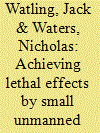

|
|
|
|
|
| Summary/Abstract |
The military application of armed small unmanned aerial vehicles (SUAVs) has been discussed for over a decade. Many of their imagined uses however overlook crucial limitations on their employment relating to power, processing, payload, cost, and control systems. Over the last three years armed SUAVs have been extensively employed on the battlefield, providing a rich set of case studies. Jack Watling and Nicholas Waters explore how armed SUAVs can be effectively integrated into the British Army.
|
|
|
|
|
|
|
|
|
|
|
|
|
|
|
|
| 2 |
ID:
149823
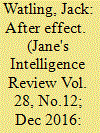

|
|
|
|
|
| Summary/Abstract |
Allied forces have begun the offensive to retake the northern Iraqai city of Mosul from the Islamic State. Reporting from Iraq, Jack Watling analyses how the successful recapture of the city will effect broader political and sectarian dynamics in the country.
|
|
|
|
|
|
|
|
|
|
|
|
|
|
|
|
| 3 |
ID:
189733
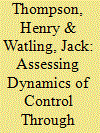

|
|
|
|
|
| Summary/Abstract |
This article examines the scale and significance of Iranian technology transfer to Ansar Allah in Yemen in underpinning the Houthi way of war. Henry Thompson and Jack Watling consider how Iran balances the transfer of manufacturing capabilities versus the provision of complete systems to exercise influence over the Houthis’ strikes on their adversaries. The article argues that the provision of key components gives Iran intimate access to Houthi planning, and therefore extensive indirect influence over how the Houthis fight. This structural dependence enables Iran to exercise command decisions without the need to intrusively exercise control.
|
|
|
|
|
|
|
|
|
|
|
|
|
|
|
|
| 4 |
ID:
174502
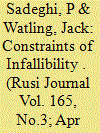

|
|
|
|
|
| Summary/Abstract |
There has been persistent confusion among European and US diplomats over the public statements of Ayatollah Khamenei on matters of foreign policy. Despite significant Iranian pragmatism in negotiations, Khamenei’s pronouncements are consistently combative. P Sadeghi and Jack Watling examine the evolution of the concept of velayat-e faqih, which underpins the position of the Supreme Leader, and how it has been promulgated, and argue that Khamenei has developed a narrative of infallibility. This, combined with the obligations pertaining to his office as an Ayatollah, have made him uniquely constrained in his ability to publicly alter his language. At the same time Khamenei has worked to centralise power around his office, thereby creating a paradox by which the most powerful decision-maker in Iran is unable to offer clear public leadership for fear of being proven wrong.
|
|
|
|
|
|
|
|
|
|
|
|
|
|
|
|
| 5 |
ID:
180500
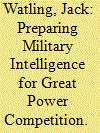

|
|
|
|
|
| Summary/Abstract |
Military intelligence (MI) is critical to visions of future war. The analytical methodologies of the War on Terror have reshaped how MI teams are trained and deployed. MI personnel are increasingly specialised, with experience and judgement being replaced by rigid adherence to robust data-driven analytical methodologies. While these methods are likely to continue at higher echelons, Jack Watling argues that a large MI presence at the tactical edge will not be practical under the indirect fire threat on the future battlefield. Furthermore, reach-back to higher echelon support will be severely constrained in a contested electromagnetic environment. Tactical echelons will therefore need an expanded organic MI capability, with experienced personnel able to perform a wide range of MI functions.
|
|
|
|
|
|
|
|
|
|
|
|
|
|
|
|
| 6 |
ID:
177480
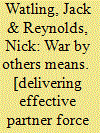

|
|
|
|
|
| Publication |
Abingdon, RUSI, 2020.
|
| Description |
v, 110p.pbk
|
| Series |
Whitehall Paper ; 97
|
| Standard Number |
9780367766405
|
|
|
|
|
|
|
|
|
|
|
|
Copies: C:1/I:0,R:0,Q:0
Circulation
| Accession# | Call# | Current Location | Status | Policy | Location |
| 059993 | 327.17/WAT 059993 | Main | On Shelf | General | |
|
|
|
|